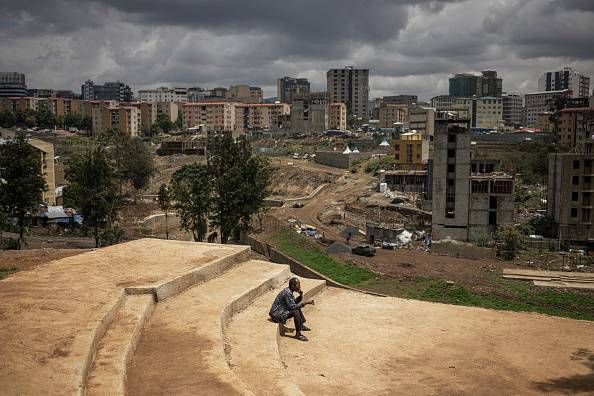
A man smokes a cigarette on a newly built terrace overlooking a construction site in Addis Ababa's historic Piazza district. (Photo: Michel Spatali/AFP)
Once a quiet mountain range overlooking Addis Ababa, Yeka Hills has been transformed into a huge construction site.
Excavators and bulldozers have been working through the night, leveling forests and farmland to make way for one of the most expensive infrastructure projects in Ethiopia's history, a vast palace complex that will serve as the official home of Prime Minister Abiy Ahmed.
The prime minister himself has been one of the staunchest advocates of the development, known as the Chaka Project, and has made regular visits to monitor its progress.
“The noise is constant around the clock,” said the ambassador, who lives near the new development. “It's becoming a nuisance and disrupting our living environment. Our complaints show little sign of being listened to.”
In addition to the palace, the sprawling 503-hectare complex includes a luxury hotel, a guesthouse for visiting heads of state, official residences for ministers, upscale residential areas and three artificial lakes filled with artificial palm trees.
Some 29 km of new roads and underground tunnels are being built to allow easier escape in the event of an emergency or coup attempt.
Government officials insist this is not a vanity project but one designed to advance Ethiopia's development priorities.
“Unfortunately, the issue of the 'Prime Minister's House' is a very simplistic narrative and one deliberately designed to stir up controversy,” said the prime minister's spokeswoman, Billeen Seyoum. “The Chaka project is a grand national satellite city project that aims to transform the face of Addis Ababa and its surroundings.”
Neighboring ambassadors are not alone in their discontent: critics have questioned the high cost, especially at a time when 20 million Ethiopians are on the brink of starvation and parts of the country desperately need funds to recover from conflict.
Seyoum denies the criticism, saying the project has created thousands of jobs. “These complaints often come from people who think of development as 'charity.'”
exceed budget
Abiy told lawmakers that the projects could cost as much as $10 billion in total, more than half of Ethiopia's $17 billion 2024-25 budget announced last week.
Prime Minister Abiy said the project would be funded privately, not from public coffers. The UAE government has been widely reported as the main investor, but some local entrepreneurs have alleged they were coerced into contributing funds.
A businessman The Globe and Mail He said he “received numerous phone calls, threats and warnings that if he did not make a donation he would not receive his official contract.”
Farmers and residents are being evicted en masse to make way for new buildings.
If an eviction notice is posted on the wall of your local church and your name is on the list, you have just a few days to pack up your belongings.
Some residents who refuse to comply have been forcibly evicted, detained in makeshift prisons, or beaten by security forces. Those evicted have been told to find new homes in Debre Berhan in Amhara region or Wellega in Oromia region, depending on their ethnicity.
Seyoum said all evictions were carried out in accordance with the law.
“Land in Ethiopia is state owned and the constitution allows the government to fully develop the land in accordance with the law,” she said.
“More importantly, much of the land being developed by the Chaka Project is uninhabited. Local residents are aware of the impact that the expansion of public infrastructure will have on the development.”
Access to the area is closely monitored, with checkpoints set up on entry and exit roads.
Access is restricted to people who previously used the area, including members of the Washa Mikhael rock-cut church and aspiring athletes who train in the hills.
Plainclothes police officers patrol the construction site to prevent people from taking photographs.
Imperial Ambitions
The Yeka Hills development is the latest and most expensive in a series of controversial projects launched by Abiy to modernize and beautify Addis Ababa.
These include refurbishing Emperor Menelik II's royal palace as part of the new Unity Park development, which will feature a museum and zoo, and demolishing much of the capital's historic Piassa district to make way for apartments and walkways.
Mr. Abiy's example has inspired other Ethiopian officials to invest in similar lavish projects. President Simares Abdisa of the Oromia region, which surrounds Addis Ababa, has opened a palace project due for completion next year.
The new palace, located in one of the capital's wealthiest areas, covers more than six hectares and is reported to have cost more than $1 billion, and will house offices and residences for Oromia's leaders. Homes were demolished and residents evicted to make room.
Abiy is not the only world leader to build a grand new home: In Egypt, military dictator Abdel Fattah el-Sisi is investing $59 billion in building a new capital city (the imaginatively named “New Administrative Capital”) with the presidential palace at its centre.
In Turkey, President Recep Tayyip Erdogan completed the $615 million, 1,100-room “White Palace” outside Ankara in 2014 and proclaimed it a symbol of a strong and prosperous “new Turkey.”
While Erdogan still lives in his creation, not all leaders are so fortunate.
Sudanese President Omar al-Bashir moved into the new Republic Palace in Khartoum in 2015 but was overthrown in the 2019 revolution. The palace was a centre of demonstrations against his authoritarian rule.
And perhaps the most infamous presidential palace was that of Zairean dictator Mobutu Sese Seko, who built a “jungle Versailles” in his ancestral hometown of Gbadlit, complete with bomb shelters and an airport big enough for a Concorde to land.
Now it lies in ruins along with his self-proclaimed empire, perhaps a cautionary tale about Abiy's ambitions.
This article was first Continenta weekly newspaper distributed across Africa. Mail & GuardianDesigned to be read and shared on WhatsApp. Download for free at thecontinent.org.

